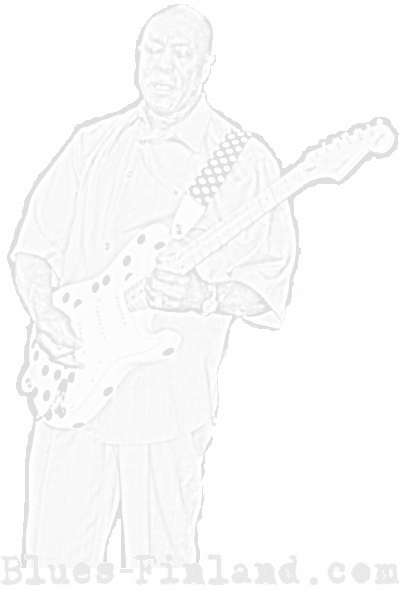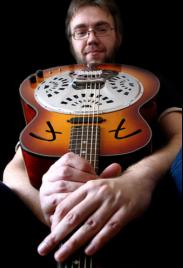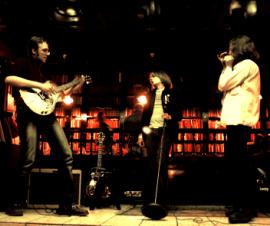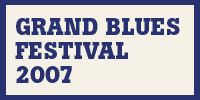 |
| (c) 2007 Blues-Finland.com |
| From Sabre Dance to Delta Blues, via Heavy Metal 20 February 2007 Want to experience some excellent blues? Go to Estonia! Bullfrog Brown is the forerunner of the Estonian blues scene - if there were a scene in the first place. Steve Lury interviews band leader Andres Roots. When you’re idly thinking about locations synonymous with quality blues, the chances are that Estonia isn’t high on your list. If that’s the case, then Bullfrog Brown are a trio of young musicians who may just change your mind. For those of you unfamiliar with the band, they are Andres Roots (guitar), Alar Kriisa (vocals) and Üllar Kärt (harp). Their music mixes Delta blues styling with original, somewhat quirky, lyrics. Their live performances have an energy, and sense of fun, that is often missing from contemporary blues bands. |
 |
| Andres Roots (c) Siret Roots |
| They recently completed a short tour of the UK, during which I was able to meet, and chat with Andres, the founder, lyricist and driving force of the band. 1. What first kindled your interest in music and led to you taking up the guitar? Well, my father had played guitar and drums in a band when he was younger and would often play and sing songs at home. And there was Dad's vinyl and reel-to-reel collection, so there was always music around, from the Stones to Bach. One of my earliest music-related memories is jumping around the room to Khachaturian's "Sabre Dance" - not the Dave Edmunds' Love Sculpture version! Anyhow, you couldn't really go out and buy rock or blues music in the Soviet Union; in the late 1980s, they did release a vinyl series called "The Archives of Popular Music" that had compilations of Elvis, early Rolling Stones, the Doors, CCR, Deep Purple, Led Zeppelin, and stuff like that, but before, there was practically nothing. However, in Tallinn, which is where I was born, we could see Finnish television and hear Finnish radio, so one way to get new music was to tape it from there. In 1984 I was eight years old and didn't really have a preference for any style of music, but my Dad used to stay up late and record things - some that he liked, and some he thought I ought to! A few years later he went to Moscow and bought me my own cassette deck - those things were strictly under the counter in Estonia. So I started recording music from the radio myself, and that's when he told me "Young men don't listen to disco or hip-hop. Young men listen to heavy metal." I can never thank him enough for that; if I hadn't taken his advice, I may never have picked up the guitar. The real impulse for learning the guitar came when AC/DC's "The Razor's Edge" was released in 19990. By then, they were selling pirate cassettes in the street in Tallinn, so I bought one with AC/DC on side A and Judas Priest's "Painkiller" on side B. And that's when I went and got my father's Czech made, nylon strung, Cremona guitar and asked him to teach me. He showed me how to tune it, taught me a few chords and a couple of basic blues progressions, and then pointed towards the cassette player: "The song is there. Now go and play." And so I did. 2. How did you find your way to the blues? Around 1992 my father took me to see John Hammond Jr. who was playing a solo show at a jazz festival in Parnu. We didn't know anything about him, but it said in the papers that both Hendrix and Clapton had played in his band at one time; I was a Hendrix fan by then, and my dad has always loved Clapton, so we went. There was a popular local band opening for him, doing encore after encore...But finally, John Hammond came on, he had a harmonica rack and a National and a regular acoustic, and he just sat down and started playing. Suddenly, I felt much better than I'd ever felt before - and that's pretty much it. Soon I got to go to Denmark, and there I picked up my first Muddy Waters CD. I remember sitting in Copenhagen at a friend's house, listening to "Train Fare Blues" and thinking: "How does he get that guitar to sound so good? How come the way the band works together is so different from all the music I've heard before, so loose and natural?" Well, I guess I'm still working on the answers. 3. Are there many other blues acts in Estonia; do you have a blues scene as such? I'll probably be crucified for saying this, but no, I would not say there's a blues scene here. There are fans, and there are good players, but they do not add up to a blues community - at least not yet. There are too many differences and too little common ground. Thus, the nearest blues club remains in Riga, Latvia. At any given time there are probably about 10 bands around that define themselves as blues bands. I myself would file half of them under "classic rock" or even "folk rock". Then again, half the people who call themselves blues fans here honestly believe that Led Zeppelin is all there is to blues, so it's hardly surprising. The bands that can be said to be technically closer to the blues are mostly your average Blues Brothers or SRV cover bands, so... Let's look at the bright side: we do have the annual blues festival "Augustibluus" held in Haapsalu. Rommy Sultangirejev started it in 1993, and he's been through hell and high water to keep it going - the man deserves a medal of honour. I hope he never stops. |
 |
| 4. Your guitar style seems pretty firmly rooted in the classic Delta Blues tradition. What attracts you to that era as opposed to more 'modern' styles, and who are your main influences? This is a difficult one. I guess part of the answer is that I've played in all kinds of bands in the past 10 years, from pub rock to psychedelia, and in every band I was in they would tell me not to make it so bluesy, to play it "normally", you know. And I'm not a great guitar player, just a stubborn one, so at one point I figured that, OK, I'll start my own band and play what comes naturally to me. |
| I think what attracts me to Delta Blues the most is the rhythms - it's so much looser and yet infinitely more complex than anything in today's Chicago blues, for example. And the slapping and popping that is more associated with funk bass players - guys like Charley Patton and Bukka White really had it down! I didn't get to hear Son House until 2004, but then when I finally saw a video of hin performing, it was a real revelation. With Bullfrog Brown I'd been doing some slapping, but nothing as wild as what Son House did, so in 2004 I set out to explore that direction. Another guy I first heard in 2004 was Johnny Shines, and he's probably had more influence on my playing than anyone else ever; I love the rhythms he does, I love his slide work, I love the feel of his songs. And then, of course, there are the usual suspects, from Lonnie to Robert Johnson, from Muddy to Mississippi Fred McDowell. It's the greatest music in the world. 5. Lots of aspiring blues artists compose their own songs, but many seem to draw from a generic lyric pool. Your lyrics though are refreshingly original, tinged in places with a kind of lighthearted surrealism. What inspires you to write, and are you influenced by any particular artists? The honest answer is Bob Dylan. I'd heard his songs, but never the way he performed them himself until I saw the live broadcast of his Woodstock 1994 show on Finnish television. The combination of the music and the words changed everything for me - and I loved the pointed raggedness of the sound! I'm firmly in the Winnie the Pooh camp where making up songs is concerned - I just let the words come that want to come. Half the time I don't know what it's all about, but I will know when it sounds good. What inspires me could be anything: a title in a TV guide, a line in a book, a melody, a story or situation...When it hits me, it hits me - if I can find a piece of paper and a pen fast enough, I've got a song. You said "light hearted" - that's a great compliment. The thing I love the most about old blues lyrics is the attitude. Many of today's blues lyricists take themselves and their issues and causes so seriously, they lose that arrogant grin that to me is the very essence of the blues. There's a huge difference between a song like "Your Funeral and My Trial" and "Still Got The Blues" - the blues may be the song of a man feeling bad, but to me, it's never the music of a man feeling sorry for himself. 6. You've just completed your first tour of the UK, kicking off in Scotland and the North where you were appearing with Dave Acari. How were you received North of the Watford Gap? Being on the road with Dave Acari is one of the coolest things I know; the guy is a monster on stage. I was really glad we’d gigged with him in Estonia so that when he suggested that Bullfrog top the bill in Glasgow, I knew well enough to say no. There are not many people alive that I would think twice about following, but I'm not going on after Dave - he has to be seen to be believed! Glasgow was great; a small pub, but packed with a wonderful crowd that was there to listen and enjoy the show. The venues in the North were most impressive. Very good equipment, great sound engineers, lovely audiences - I don't think we've had people come up to us after a show before to have their photo taken with our ugly mugs. 7. I gather the venues you played in London were different in size and style to those you played up North? Yes, the London venues were more like the pubs and clubs we've played everywhere else. Even the problems were similar, like the peanut sized monitors in Nunhead that only seemed to have two options, "mute" and "feedback". I think the two venues I liked best were Oliver's in Greenwich and the Fighting Cocks in Kingston. Oliver's is such a lovely little club right out of the sixties - I was literally too tall to stand up on the stage... Great atmosphere. The Fighting Cocks was very cool in a different sort of way, a great venue, and the girl that did the sound was incredible - I don't know her name, but it was the best sound we had in the UK! 8. How do UK audiences compare to those in Estonia. Any major differences? I wouldn't say so; everybody loves our version of "Smoke On The Water"! Seriously though, I think the age characteristics are pretty much the same, basically people of any and every age. I think the UK clubs and pubs do have stricter restrictions for the underage, so maybe we did have fewer teenagers in the audience there. One thing that Alar pointed out was that in Estonia audiences are quite timid during the breaks - it is not often that someone you don't know comes up to talk to you after the show, whereas in the UK he felt that the whole pub was talking to him. I don't know about that, I just noticed that it was very hard for us to spend any money on beer - complimentary pints kept arriving from every direction. Another thing was that the people who came up to buy a CD in England seemed to want an exact replica of the gig we'd just played. It's never been an issue before, but there they were, "Which CD has all the songs you just played? But you have drums on here, will it be the same?" It's never the same, that's the whole bloody point! 9. This is your first visit to the UK. Has it lived up to your expectations? Yes and no. Yes in the sense that not only did we enjoy playing the shows, we also loved the Country - and, most importantly, we met a lot of wonderful people everywhere we went. So in that way it was everything and more than what we expected. And then again, in another way it was not what we expected at all. It was an absolutely incredible feeling walking to a gig in Deptford and being told that here's where Mark Knopfler used to live, and on that corner was the White Swan he sings about in "Sultans of Swing", and so on and so forth. Except that it was followed by the announcement that the Bird's Nest, where we would be playing that night had been the last live music venue left in the area, and they'd just cancelled all the gigs except ours. What?! That's the most extreme example, but really, it was the same story everywhere we played in London - there's work for DJs but not for musicians. And that felt like... Well, you know the famous story where a young Keith Richards arrives at the Chess studios in Chicago, a dream come true for him, and there's Muddy Waters painting the goddam ceiling? I think it's a perfect illustration of how we felt, a very rough way to put things in perspective. 10. Finally, how do you perceive the future of the Blues, if in fact, it has one at all. I don't really have any doubts about the longevity of the Blues, provided there is a future for live music in general. The logic behind the American recording ban of the 1940s was the fear that records would replace live musicians; a lot of people have laughed about it since, as have I, and it's certainly not what happened then - but as our London experience seems to indicate, we are not out of the woods yet. The Blues is not the problem; it's all that easy-listening stuff that has been marketed as Blues in the past 25 years. That is why every blues artist I know can tell you stories about folks coming up after a gig to say: "I don't like the Blues, but I loved what you just did!" I could tell you stories like that myself: from Estonia, Czech, Finland - it happens everywhere we go. I don't think it's a testimony to our extraordinary skills of presentation or super original approach to song writing, or any other nonsense. I think the people who say that have honestly never heard the blues before. Sure, they may have seen Gary Moore looking sad on TV and been told that everything Eric Clapton does is blues, but they wouldn't know Howling Wolf from Adam. I don't mean that the Blues shouldn't evolve. I love bands like Delta head and Black River Bluesman, but there's a huge difference between using outside influences to help build what you've got, and watering down what you have in the hope of commercial success. I don't think that using elements of the blues to make better hip-hop, rock, country, pop or whatnot qualifies as "evolution" for the Blues. It's the other way around. The Blues is "natch’l" and it's about time we stopped trying to grow it artificially. I don't think we can "save" the Blues by going on and on about the need to preserve it and making it part of the school programme - that will only lock the Blues in a museum, somewhere between Wagner and Dixieland. If we want the Blues to live, it's about time we stopped acting like it's dying. STEVE LURY Links: Bullfrog Brown, Bullfrog Brown MySpace |
| Bullfrog Brown (c) Evert Palmerts |


